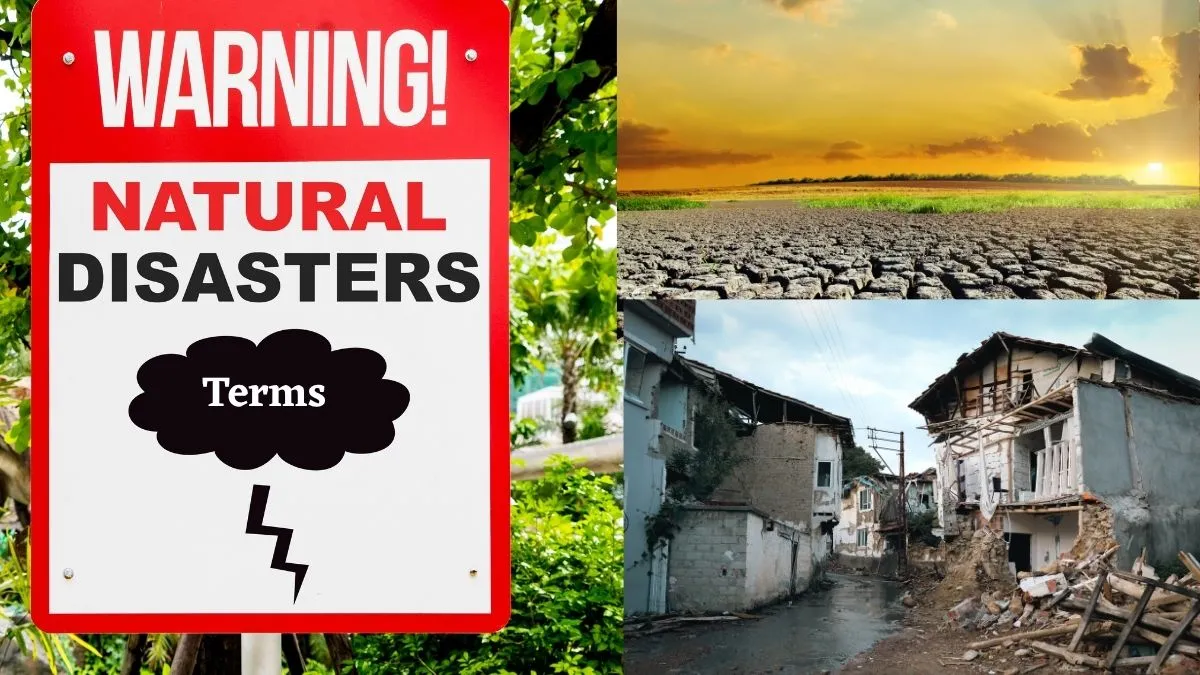- By Aditi Priya Singh
- Thu, 17 Jul 2025 05:31 PM (IST)
- Source:JND
Key Terms For Natural Disasters: Natural disasters are sudden and extreme events caused by natural forces such as the movement of the Earth, weather changes, or rising water levels. These include earthquakes, floods, cyclones, droughts, landslides, volcanic eruptions, and more. Natural disasters can destroy homes, damage the environment, and even take lives. That’s why it's very important to understand the key terms used during these emergencies. These words help people, rescue teams, and news channels communicate clearly and quickly.
For example, terms like “epicentre,” “aftershock,” “storm surge,” or “evacuation” give specific meanings during a disaster situation. Students, teachers, and even regular citizens can benefit from knowing these words, as they are commonly used in weather forecasts, news reports, and emergency alerts. Understanding these terms also helps in spreading awareness and educating others about how to respond during natural disasters.
In this article, we’ll look at 30+ key terms often used during natural disasters and what they mean. This will help you build knowledge and stay prepared in case of any emergency.
Earthquake-Related Terms
1. Epicentre – Point on Earth’s surface directly above the earthquake origin.
2. Magnitude – Measure of energy released during an earthquake.
3. Aftershock – Smaller quakes that follow a major earthquake.
4. Fault Line – A Crack in the Earth’s crust where earthquakes occur.
5. Tremor – A light shaking or vibration of the ground.
6. Richter Scale – A tool to measure earthquake strength.
7. Seismograph – An instrument that records earthquake waves.
8. Tectonic Plates – Large moving pieces of Earth’s crust that cause earthquakes.
ALSO READ: 30+ Trending Climate And Environment Slangs Or Terms You Need To Know In 2025
Volcano-Related Terms
9. Volcano – An opening in the Earth’s crust where lava erupts.
10. Lava – Molten rock that comes out during a volcanic eruption.
11. Ash Cloud – A cloud of volcanic ash expelled into the air.
12. Eruption – The act of a volcano releasing lava, gases, or ash.
13. Magma – Molten rock beneath the Earth's surface.
Storm and Wind Disasters
14. Hurricane – A massive storm with strong winds and rain.
15. Typhoon – A hurricane in the western Pacific region.
16. Cyclone – A large system of winds rotating around a low-pressure centre.
17. Tornado – A violent rotating column of air from a thunderstorm.
18. Twister – Another name for a tornado.
19. Storm Surge – Sea water rises caused by a storm pushing the ocean inland.
20. Severe Weather Alert – Warning issued for extreme weather events.
Flood and Water-Related Disasters
21. Flood – Overflow of water onto normally dry land.
22. Flash Flood – Rapid flooding due to heavy rainfall.
23. Evacuation Route – A Safe path used during floods or other disasters.
24. Landslide – Downward movement of rock and soil.
25. Tsunami – A Huge ocean wave caused by an underwater earthquake or eruption.
Heat, Drought & Climate-Related Disasters
26. Drought – A Long period with little or no rainfall.
27. Heatwave – A period of abnormally hot weather.
28. Climate Change – Long-term alteration in temperature and weather patterns.
29. Wildfire – An uncontrolled fire in forests or grasslands.
ALSO READ: 40+ Common Medical Terms And Their Full Forms You Must Know To Understand Your Body Better
Emergency and Response Terms
30. Emergency Evacuation – Immediate removal of people from danger.
31. Shelter-in-Place – Stay indoors during emergencies for safety.
32. Disaster Relief – Aid given to victims after a disaster.
33. First Responder – First person (like a firefighter or medic) to arrive at a disaster scene.
34. Emergency Kit – A set of essential items needed during disasters.
35. Search and Rescue – Operation to locate and save people after disasters.

